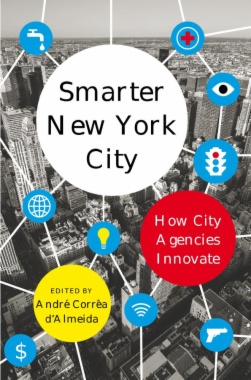Innovation is often presented as being in the exclusive domain of the private sector. Yet despite widespread perceptions of public-sector inefficiency, government agencies have much to teach us about how technological and social advances occur. Improving governance at the municipal level is critical to the future of the twenty-first-century city, from environmental sustainability to education, economic development, public health, and beyond. In this age of acceleration and massive migration of people into cities around the world, this book explains how innovation from within city agencies and administrations makes urban systems smarter and shapes life in New York City.
Using a series of case studies, Smarter New York City describes the drivers and constraints behind urban innovation, including leadership and organization; networks and interagency collaboration; institutional context; technology and real-time data collection; responsiveness and decision making; and results and impact. Cases include residential organic-waste collection, an NYPD program that identifies the sound of gunshots in real time, and the Vision Zero attempt to end traffic casualties, among others. Challenging the usefulness of a tech-centric view of urban innovation, Smarter New York City brings together a multidisciplinary and integrated perspective to imagine new possibilities from within city agencies, with practical lessons for city officials, urban planners, policy makers, civil society, and potential private-sector partners.
- Table of Contents
- Foreword
- Preface
- Acknowledgments
- Introduction, by André Corrêa d'Almeida
- Part I: Data, Organization, and Technology
- 1. A City Strategy with Global Relevance: OneNYC & the SDGs, by Jessica Espey and Nilda Mesa with Sandra M. Ruckstuhl and Mihir Prakash
- 2. The Mayor’s Office of Data Analytics: Institutionalizing Analytical Excellence, by Craig Campbell and Stephen Goldsmith
- 3. LinkNYC: Re-Designing Telecommunication to Activate the 21st Twenty-First Century Creative City, by Maren Maier and Mary McBride
- Part II: City Service and Domains of Life
- 4. The New York City Business Atlas: Leveling the Playing Field for Small Businesses with Open Data, by Andrew Young and Stefaan Verhulst
- 5. Incentives for Smarter Energy Management: The Experience with Demand Response, by André Corrêa d'Almeida and Christopher Lewis
- 6. The NYC Green Infrastructure Plan and Opportunities for Innovation in Climate Change Resilience, by Bernice Rosenzweig and Balazs Fekete
- 7. Innovations for Sustainability via NYC's Residential Curbside Organic, by Ana Isabel Baptista
- 8. Syndromic Surveillance System: The Art and Science of Actionable Health Information, by Megan Horton and Joseph Ross
- 9. Solving City Challenges through Neighborhood Innovation Labs: Moving from Smart Cities to Informed Communities, by Constantine E. Kontokosta, Jeff Merritt, and Sander Dolder
- Part III: Safety and Mobility
- 10. New York City Police Department: ShotSpotter, and the Shift to “Precision-Based” Policing, by Tami Lin and Malgorzata Rejniak
- 11. Vision Zero NYC, by Arnaud Sahuguet
- 12. Midtown in Motion: Real Time Solutions to Traffic Congestion, by Lawrence Lennon and Gerard Soffian
- Part IV: Becoming a Smarter City
- Conclusion: A System’s Approach for Innovation in NYC, by André Corrêa d'Almeida and Kendal Stewart
- Epilogue: Global Future Possibilities, by Jerry MacArthur Hultin
- Contributors
- Index

